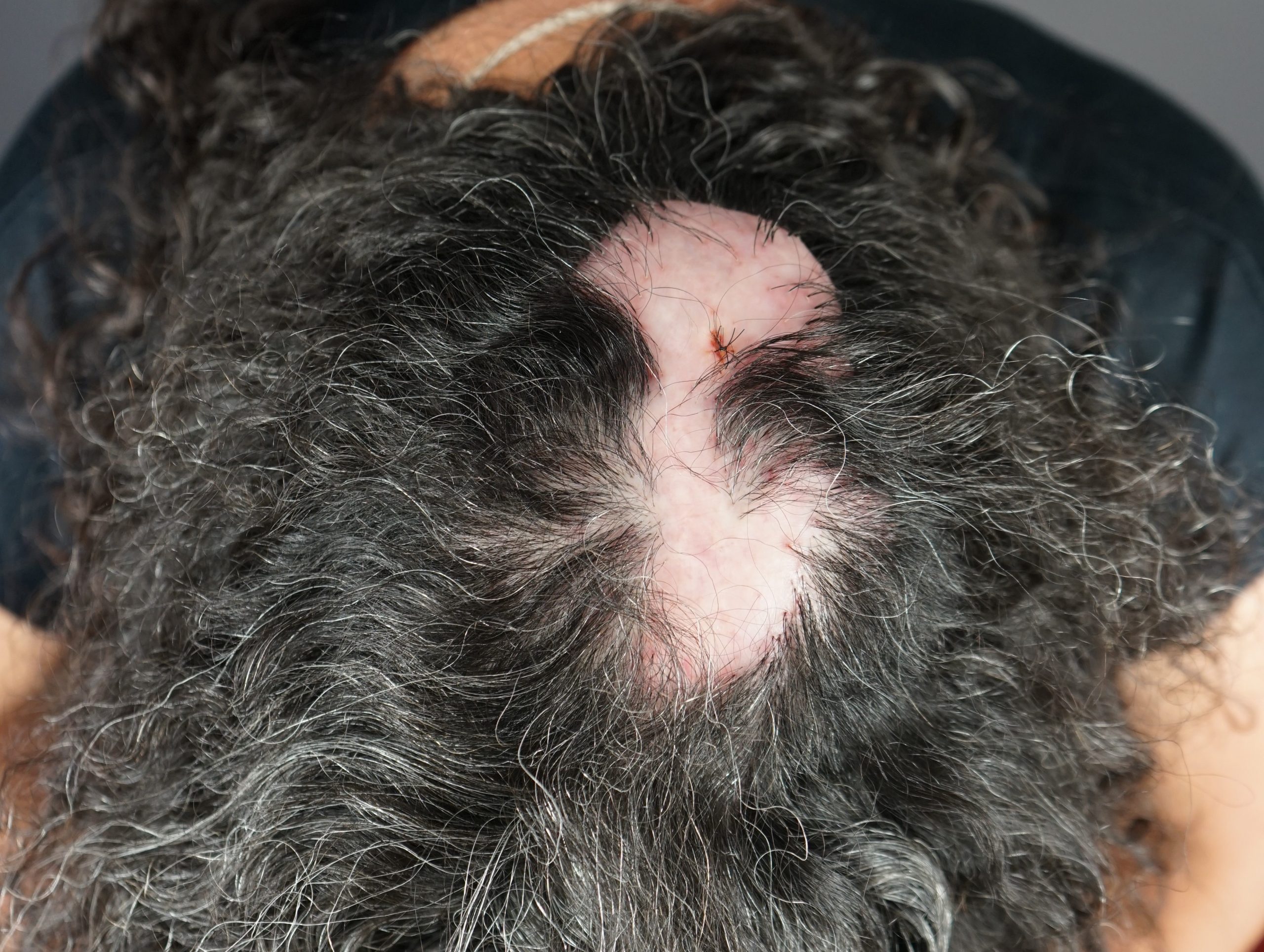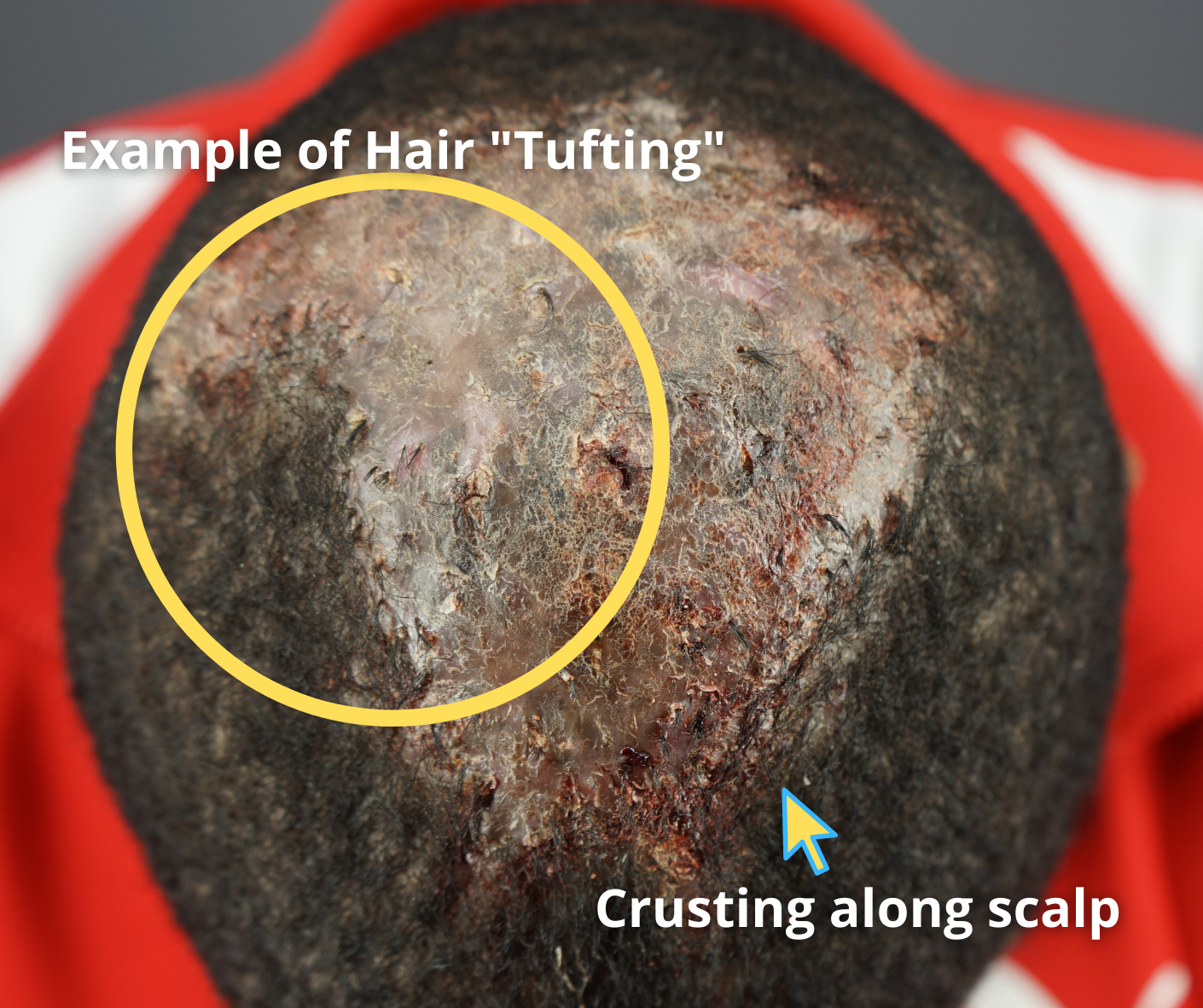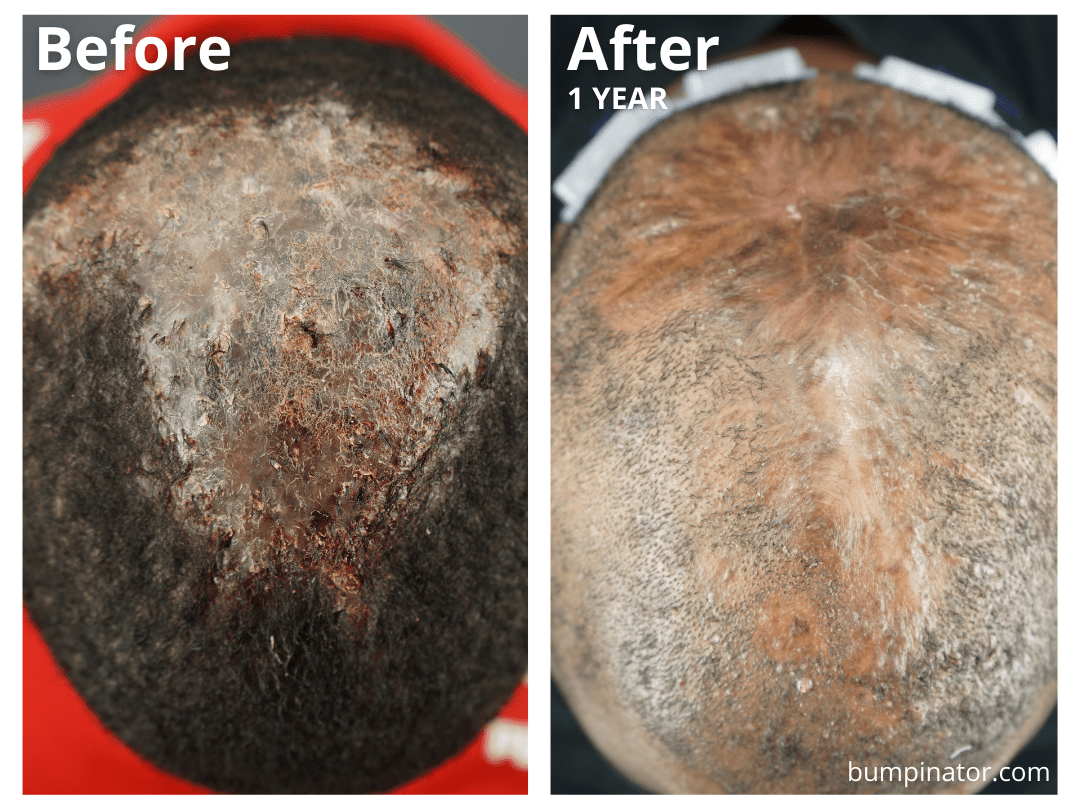What is Folliculitis Decalvans: Folliculitis Decalvans (FD) is a rare, chronic (long-term) cicatricial (scarring) alopecia that occurs in adults. FD occurs on the scalp and is known to cause permanent hair loss due to the scarring and prolonged autoimmune response associated with it.
Folliculitis Decalvans is derived from Latin and means “inflammation of the hair root associated with hair loss.”
Specifically, Folliculitis Decalvans (FD) is classified as primary cicatricial or scarring alopecia, a group of disorders in which the inflammatory process targets the hair follicle, resulting in follicular destruction (hair loss) that can eventually lead to permanent hair loss.

Symptoms of Folliculitis Decalvans
Some of the reported symptoms associated with FD include:
- Temporary or Permanent Hair Loss
- Patchy Hair Loss
- Irritated Spots
- Pimple-Like Sores Around Affected Area
- Pain and discomfort Centered Around the Affected Area
- Tufting of Hairs Growing Out of a Single Follicle
- Redness or Swelling of Affected Area
- Scaly or Crusted Patches of Skin Surrounding Affected Area
- Scarring of the Scalp
What Causes Folliculitis Decalvans
The cause of Folicululitis Decalvans (FD) is currently unknown. Medical experts speculate that this condition may be caused by an abnormal response to bacteria, particularly Staphylococcus aureus.
A study by Dr. Sanusi Umar et al suggests that Folliculitis Decalvans (FD) is likely the same disease spectrum as Acne Keloidalis Nuchae (AKN) with the two conditions frequently occurring together [1].
What Folliculitis Decalvans is Not
FD is not a contagious condition, a type of skin cancer, or a keloid.
Who is Affected by Folliculitis Decalvans (FD)?
Folliculitis Decalvans is a relatively rare condition that accounts for 3% of 3133 diagnoses of alopecia and 11% of 840 diagnoses of cicatricial alopecia [2].
FD affects both men and women, but men more commonly. It is not known to be hereditary, although there are reports of it affecting members of the same family. Furthermore, there is a higher incidence of Folliculitis Decalvans (FD) in people of color.
Does Folliculitis Decalvans Hurt?
Patients who have had Folliculitis Decalvans are known to report pruritus (skin itching) or pain. FD can cause the area of the scalp to become itchy and painful, sometimes feeling tight. At other times, no discomfort may be felt.
What Does Folliculitis Decalvans Look Like?
FD generally presents as an “expanding patch of alopecia with peripheral pustules on the scalp.”[3]
The affected scalp area may become red and swollen, forming scaly areas, scabs, and crusts. Pus-filled nodes may develop, most commonly on the back of the head, but any other part of the scalp may be involved [4].
Another characteristic feature of Folliculitis Decalvans (FD) can be seen in “tufting.” Tufting is a condition in which several hairs exit from the same hair follicle on the scalp skin. It may lead to an appearance of hair similar to the bristles of a toothbrush. Bald patches can eventually develop and increase in size, leaving permanent scarring hair loss. The medical term for this permanent hair loss through scarring is “cicatricial alopecia.”

How is Folliculitis Decalvans Diagnosed?
Diagnosis can generally be made by a dermatologist examining your skin, sometimes using a handheld magnifying light to look more closely at the hair follicles.
In some cases where additional confirmation is needed, some dermatologists may require a skin sample (skin biopsy) or a skin swab taken with a cotton wool bud to confirm the nature of the condition.
Folliculitis Decalvans Patient Example – Before and After Surgical Removal by The Bumpinator

Treatment for Folliculitis Decalvans
There is currently no standard effective treatment for Folliculitis Decalvans.
Generally, Folliculitis Decalvans (FD) is treated with systemic antibiotics.
Other treatments may involve a combination of medicated shampoos, anti-inflammatory and antibacterial scalp, oral antibiotics, combinations of antibiotics, steroid injections, steroid creams, lotions, ointments, or more. Yet, most of these general treatments for Folliculitis Decalvans (FD) only offer a temporary, not permanent, solution to the problem.
Known as a relentless condition, treating Folliculitis Decalvans (FD) using the methods mentioned above may only lead to constant visits to the doctor or dermatologist for the patient, such as constant injections, which may not be the best solution for the patient’s overall health. Additionally, due to the relentless nature of this condition, untreated or improperly treated Folliculitis Decalvans (FD) using these methods mentioned above will eventually lead to a worsening of this condition and permanent hair loss.
A SPECIALIZED APPROACH TOWARD THE PERMANENT ELIMINATION OF FOLLICULITIS DECALVANS (FD):
Fortunately, there may be a permanent solution.
Dr. Sanusi Umar, has developed a personalized approach to permanently eliminating Folliculitis Decalvans (FD).
Using his specialized procedures and inventions, he created such as his patented Athena Suture Kits, Dr. Sanusi Umar, AKA The Bumpinator, has been able to successfully eliminate Folliculitis Decalvans (FD) in several happy and satisfied patients using his combination of personal inventions and procedures, laser surgery, non-pharmaceutical botanicals, and in some rare cases, a combination of these elements along with radiation therapy.
Do Not Wait. Folliculitis Decalvans is Relentless and Can Worsen Over Time
Suppose you suspect you have Folliculitis Decalvans (FD), bumps on your head that won’t go away or are painful or uncomfortable. In that case, it may be time to get it checked by a licensed dermatologist specializing in these rare skin conditions.
Use the button below to schedule a free video consultation with Dr. Bumpinator. This will help treat your condition immediately before it gets any worse.
Further Reading
Keloid Scar Treatment: The Bumpinator Method of Ridding Keloids Permanently
What is a Keloid Scar? How do I Prevent it?
Large AKN Bump Removal: Amazing Before & After AKN Surgery Results
Dr. U AKA The Bumpinator’s Anti-AKN & Anti-FD Invention: Athena Suture Kits
References
1. Sanusi Umar, J., 2022. A Retrospective Cohort Study and Clinical Classification System of Acne Keloidalis Nuchae. [online] PubMed Central (PMC). Available at: <https://www.ncbi.nlm.nih.gov/pmc/articles/PMC8142833/> [Accessed 17 March 2022].
2. Vañó-Galván, S., Saceda-Corralo, D., Blume-Peytavi, U., Cucchía, J., Dlova, N., Gavazzoni Dias, M., Grimalt, R., Guzmán-Sánchez, D., Harries, M., Ho, A., Holmes, S., Larrondo, J., Mosam, A., Oliveira-Soares, R., Pinto, G., Piraccini, B., Pirmez, R., De la Rosa Carrillo, D., Rudnicka, L., Shapiro, J., Sinclair, R., Tosti, A., Trüeb, R., Vogt, A. and Miteva, M., 2022. Frequency of the Types of Alopecia at Twenty-Two Specialist Hair Clinics: A Multicenter Study.
3. Uptodate.com. 2022. UpToDate. [online] Available at: <https://www.uptodate.com/contents/folliculitis-decalvans#:~:text=Folliculitis%20decalvans%20(FD)%20is%20a,experience%20associated%20pruritus%20or%20pain.> [Accessed 16 March 2022].\
4. Bad.org.uk. 2022. [online] Available at: <https://www.bad.org.uk/shared/get-file.ashx?id=165&itemtype=document> [Accessed 16 March 2022].
